For the most part, the language learning community is relatively sane and cancer free compared to other communities. Mostly because learning a language takes a certain degree of intelligence and discipline which tends to weed undesirable people out to some extent, but that doesn’t mean the community has its problems: Enter the polyglot, conlanging communities and the many scammers that want to make a quick buck.
There are people who are legitimate multilingual people out there, people who take the time and effort learning languages. Maybe they grew up in multilingual households, lived in various countries over the years, and/or spent many years and time really pouring time into each language and practicing. This thread is not talking about them, This thread is about the laughably obvious and fake polyglots on Youtube, Tiktok, etc. that claim to speak an insane amount of languages and do it for attention, internet fame, and money, the many language learning scams, and the drama in the conlanging communities that goes back way before the internet.
Pseudoscience and Language Learning Scams
Pseudoscience is a growing problem in the sphere of language learning. Many times, teaching methods are only backed up by testimony and reviews which aren't always the most reliable, especially if the creators of said methods try and hide the bad ones. Even if there are linguistic studies done, they often aren't replicated. These language learning methods not only can cost the learner money, but also valuable time. Not to mention many of them are so laughably questionable that they are hilarious.
"Learning Esperanto first improves your ability to learn other languages!" Esperanto, a constructed language originating in the 19th century that has a strong community of speakers to this day has had this problem where a few academic studies were done in the past and most of them are very flawed, yet they are always cited by the Esperanto community as to why you should learn Esperanto despite not being at least borderline autistic and/or into conlangs which are the only reasons people would seriously learn it. One of them was the program called Springboard to languages where they had these primary school aged kids learn Esperanto thinking that it would help them acquire real languages faster later on in life (will add more)
In this video, he shows a sentence that he used when assessing the children. Basically, he had the children who learned Esperanto and the children who learned French try to translate this sentence:
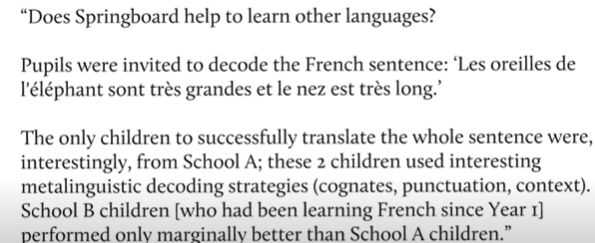
This sentence is a very bad sentence to use. Why? Because it is made up of almost nothing but Esperanto cognates (oreilles=oreloj, tres=tre, grande= granda, nez = nazo, est=estas etc.) Wouldn't it be more ideal if the sentence was made up of French words where most of them were completely different from what they mean in Esperanto and English? It is no wonder that the Esperanto kids could understand the sentence, especially since with Esperanto, you don't have to spend like 2 weeks learning verb conjugations so they could cover way more in a short amount of time.
The initial Springboard to Languages study was done from 2006 to 2016. What Esperantists won't tell you that that in 2018, the Springboard to Languages study had a follow up with the kids when they were older to see how well they acquired a second natural language and this is a choice quote from the abstract
(source)
On the one hand, results indicate that for novice child learners, Esperanto was easier to learn than French, and that learning Esperanto may have a levelling effect that compensates for individual differences between children. On the other hand, the findings also show that these apparent advantages of Esperanto did not translate into measurably greater benefits for the development of metalinguistic awareness, or greater subsequent success in learning another foreign language. Moreover, learning Esperanto could not compensate for low language learning aptitude
Luckily, aside from that, the Esperanto community is relatively sane, at least once you get to the certain level of fluency. There is an ongoing debate called "riismo" which basically is whether or not Esperanto should adopt a gender neutral singular pronoun which many people think should be "ri". This debate has been going on for a long time almost since the Esperanto community started, but with more people identifying as "nonbinary," it has definitely started gaining more traction. With that said, in some ways, the Esperanto community's attitude about the language has changed over the years. Initially when the movement was first established in the 19th century, there was still the movement of pushing Esperanto toward being a universal language and what they called the "Fina Venko" starting in the 1980s and with younger generations since then, the attitude has changed and an attitude dubbed "Raŭmismo" has been gaining popularity. Essentially, it is the view that Esperanto is more of a geeky hobby and community rather than a movement and more younger people learning the language take this view. I will get back to the conlanging community later.
Learn languages when you sleep!
These have been popping up on Youtube a lot and claim that you can learn languages while listening to them when you sleep. Often times they incorporate binaural beats to it claiming that it can help you concentrate, which, if you don't know, is bullshit. All binaural beats are is that all they are is an auditory illusion where sounds of slightly different frequencies are emitted into each ear and this creates a third sound which doesn't actually exist, but rather a filler sound the brain perceives when processing the different frequencies that gives the illusion of a rhythm. This isn't new by the way like a lot of people make it seem, it was discovered in the 19th century.
It is pretty obvious if you have ever slept during a class at school that these videos won't work, yet that doesn't stop them from being everywhere on Youtube.
Matt vs. Japan Scandal
In 2021, Matt or Matt vs Japan and his friend Ken Cannon released an 800 dollar course all about Japanese pitch accent called Project Uproot. The price alone would probably make people raise an eyebrow, but this just teaches you pitch accent. Pitch accent although mastering it will make you sound less like a foreigner, it isn't the end-all be-all and you can find a lot of videos and info about pitch accent for free or astronomically less money.
Most people gave Matt the benefit of the doubt until one day, Matt was interviewing someone who passed the highest level of the JLPT proficiency test after only about 450 days. He never uploaded the interview, but the guy who he interviewed had leaked the audio of them talking afterwards and how he essentially insults his fans and customers calling them "gullible whales" for buying his products and admitting that they are mediocre compared to some of the options that cost less.
This isn't the first time he insulted his fans/paypigs, here is a chatlog of him insulting them on Discord:

Matt has also tried to silence the guy's friend for leaking the audio:
This silencing of critics also includes his supporters. In the language learning subreddit r/LearnJapanese, a janny known as Nukemarine kept deleting anyone calling out Matt. People started getting suspicious and looked into Nukemarine and it turned out that he was actually one of Matt's biggest simps and insulted peopel in PMs who tried to reason with him. Luckily, the r/LearnJapanese reddit banned Nukemarine and apologized for the trouble he caused. Still, it caused a lot of drama.
This is the post that was deleted by him:
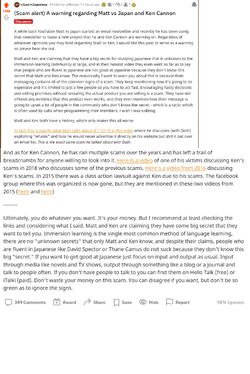
Evidence of Nukemarine's simpery:

This is a PM from him defending his decision to close the thread and insulting one of the people calling him out.

The moderation team apologizing after he got banned
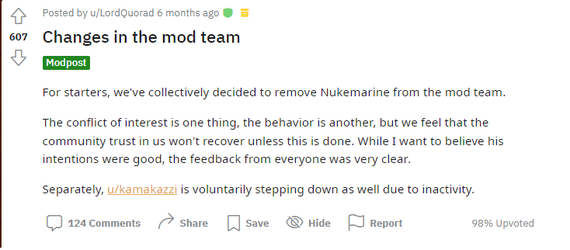 Ken Cannon and Japanese from Anime
Ken Cannon and Japanese from Anime
Ken Cannon is friends with Matt and he has claimed to have done a majority of his Japanese learning through anime (and does mention that one really old 80s Let's Learn Japanese course and Pimsleur, but that isn't important). He has made claims that he has reached fluency by watching the entirety of One Piece
six times (which is impossible since One Piece hasn't ended yet at the time of writing this) and also flexing on the fact that
girls gave him attention on language exchange services, which, if you are a woman who has tried to use a language exchange app, those kinds of guys are what completely make those apps unusable and here he is giving people false hope that you too can get your Japanese waifu on your language apps.
Anyone who has watched anime or has studied Japanese knows that anime characters talk completely differently from actual people. If you try to learn from anime without a good foundation for Japanese grammar, pragmatics, and language, then it is a recipe to make you sound like a cartoon character or you won't pick up nearly as much as you could than if you also had more formal instruction via a textbook, also, you probably shouldn't just limit yourself to anime and manga as far as learning from Japanese media goes.
Part of the curriculum includes watching One Piece episodes three times in a row


Customer Testimony about not getting a refund from Ken
This wasn't a one-time thing either, several people couldn't get refunds including this guy. Ken refused to respond to any emails:

Another testimony from a dissatisfied customer:
 Ikenna Method
Ikenna Method
This method was made by a polyglot youtuber is claimed to be based on studying personality psychology (aka discredited junk science) and "10 years of language learning." Note that when he says language learning experience, he doesn't specify what kind of experience. Does he have any experience with teaching? Any qualifications? Any experience with linguistics and language acquisition? Of course not. There is nothing evidence based at all about this.

Here is what you get with this course:
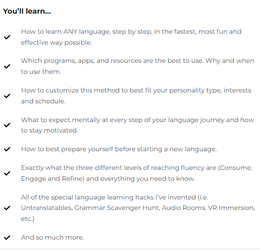
The biggest offender though is the price. Normally it is 200 dollars, but it is currently on sale as of writing this thread for 90 dollars. To compare, you can get a solid language textbook for under half the price and tons of advice for free. Again, this is just to teach methods, not for actually learning a language.
 Here are some red flags to know if you are dealing with a fake polyglot or not:
They claim to have learned several languages in a short period of time and have this secret way of doing this.
Here are some red flags to know if you are dealing with a fake polyglot or not:
They claim to have learned several languages in a short period of time and have this secret way of doing this.
Usually, these people who are fake polyglots are usually fairly young for how many languages they speak. This should tip one off since while it can be possible for a 19 year old to know three or so languages via family, living abroad, and/or school, these people are often relatively young and claim to know as many as 10 or 20.
They are also huge grifters, these people will try and sell their own secret methods for a decent amount of money, but once you purchase from them, typically you will find that most of these methods are either such common sense that anyone who has went to high school and college and actually tried to get good grades would know or they are wildly inefficient.
Infact, most of the time, a lot of these methods aren't very evidence based. This is a problem with most language learning tips out there, there is definitely a lot of research out there on language learning methods, but most of the time none of these people show any peer-reviewed data or cite any sources to prove that these methods work.
Also, many of them don’t talk about the hours a day you need to study or they claim that you only need to study an hour a day over a short period of time. This is way different from someone that spends all their free time learning languages versus someone who only studies 15 minutes to an hour a day.
Another thing to keep in mind is that it is pretty easy when recording at home to have have scripts and rehearse things ahead of time before speaking.
When they speak the language, they only say very superficial things
This is a little bit trickier to discern because if you don’t know how to speak the language, anything sounds impressive. However, if you do, you will find that they mostly only say very basic things and don’t have very deep conversations with the native speakers, even if you don’t speak the languages yourself, yourself, you can tell from the subtitles that what they are saying is fairly standard beginner stuff that you learn in the first few chapters of a textbook without any too crazy topics. There are some cases that native speakers have pointed out that these people aren’t even responding correctly to what the native speakers say. To a monolingual person who doesn’t know anything about the languages, anything sounds impressive, they could be speaking gibberish and it could sound impressive. It is common for a person to say when they find out you speak or are learning the language to “say something in that language” most of the time, you can make something up or not speak it perfectly at all to someone who doesn’t know the language and you can impress them if they don’t know any better. Ignorance is how they are able to keep up their grift.
(Notice in these examples that even without knowing nothing about the language, you can tell in the subtitles they are talking about very basic topics like about speaking said languages and saying/asking where he/they from, ordering food, etc.)
They aren’t honest with their proficiency and claim high levels of skill on every language
A good way to tell someone is legitimate is if they are honest and humble about their language abilities. I want to make this clear that there is nothing wrong with dabbling in various languages, the big problem is that they aren’t honest. Sometimes they do concede they aren't super fluent after only a short period of time or they did much more than that, but it is usually at the very end of a long video.
By the way, if you are in the language learning/polyglot community, then you will see letters and numbers like "B2" and "C1" being thrown around. This is the a reference to the CEFR language assessment aka the Common European Framework of Reference. The CEFR assessment is used to test language abilities. There is some debate on what level is sufficient enough to strive for, especially if you want to move on and study other languages (though it is common for language learners to study 2 or 3 which can be doable depending on free time and other factors like how different the languages are as if they are too similar it can be confusing), but the most common answer is around B2 to C1. Here is a rundown of the scales:
A1-A2: This is commonly commonly referred to as "Beginner" and "Advanced Beginner" basically, you know simple phrases, order food, go shopping, ask for directions, where you are from etc. Basically, what you need to do in order to function on a standard week long vacation. You might not understand everything that is being said, but you know how to tell people in that language to speak slower or that you don't understand. The stuff at this level are the things that these polyglots often speak when in public. With A1, you know basic phrases, but don't fully grasp the grammar whereas with A2, you know some basic grammar enough to form some basic sentences on your own, but not quite enough to completely express all of your thoughts.
B1-B2: With B1, you understand a good portion of the grammar and you have enough vocab to fluently talk about your interests and the topics relevant to your life and interests in addition to all of the stuff in the previous levels. Basically, you are about the level of a standard high functioning autist where you can talk about your interests, but any other topics you clam up and struggle to carry on a conversation. Though, unlike said autist, you can function enough language-wise to live in that country on your own for a long period of time, especially if you continue to improve. With B2, you have enough understand of grammar and enough vocab to speak with a lot more confidence and can hold your own in most conversations and can express your opinions with ease. This is the equivalent of most uneducated native speakers. You can probably hold down most jobs in that country and answer interview questions to get the job. B2 is a good language goal to have.
C1-C2: This is the Advanced level. With this level, you can do college level writing. You have such a good grasp on the language, you can make up puns, write decent poetry, high literature and do general wordplay. You know a lot of the bookish synonyms and can have long debates and deep conversations with people. Like mentioned before, not all native speakers can reach this level, especially if they are not educated. At least a C1 is ideal if you are planning to go to a university in that country.
It should be noted that CEFR assessments often times are a little less accurate with languages that have non-Latin alphabets like many Asian languages (hence the European part). To remedy this, some Asian countries have their own assessments. A very well-known one being the JLPT which scores you from 5-1, 5 being the most basic and 1 being the most advanced. Despite being very widely accepted by most Japanese universities and the government, a common criticism is that it only tests you on receptive language abilities, namely reading and listening and doesn't test your expressive abilities to speak and listen. It should also be pointed out that people often study for these assessments ahead of time before taking them like any test so they are usually at the top of their game and the longer the time passed since the assessment, the less reliable it becomes, especially if they aren't using the language regularly since people can forget.
The clickbait titles
This is another big one. Usually the titles are something like “White/black guy orders food in Chinese at a Chinese restaurant” It is funny to note that if a foreigner who goes to an English-speaking country speaks English, it wouldn’t nearly get the same reaction as a native English speaker speaking a foreign language. Also, like mentioned previously most of the reactions are superficial as they are strangers on the street. Most language learners note that if they actually have deeper conversations with these people, they don’t usually have the same reaction since they are seen more as a person rather than entertainment. Also, typically the lesser the language is studied, the bigger the reaction typically.
"Chinese people shocked at White guys reading Chinese newspapers"
Other examples of clickbait stunts from Xiaonyc for attention include:
"I won free tacos at a Duolingo restaurant" (Spoiler: he literally had to say the word "Portuguese" in Spanish aka "Portugues" to get them)
"White guy suddenly speaks during food massage"
"American Orders Halal food in Urdu, boss stunned"
"Chinese people overhear white guy speak Chinese on phone"
"White guy speaks multiple African languages in Nigerian market, locals stunned
They like identifying themselves as a polyglot
This alone doesn’t always mean the person is a fake, but combined with one or more of the traits above and it adds more suspicion. It is sort of like people with PhD’s going by “Dr.” most people with PhD’s don’t usually refer to themselves as “Dr.” unless they want to brag or grift.
But don’t they encourage people to learn languages?
This is a common defense a lot of their supporters throw out as to why these people shouldn’t get the hate that they do. While they might encourage people to start trying to learn a language initially, they can cause people to get discouraged and give up because they aren’t making as much progress as their polyglot idols, especially if they use the techniques that they try and sell to people which can make people think that the problem is them or that they are too dumb to learn a language because they don’t make as much progress.
Also, these people can also make people who only want to master one or two languages feel very inadequate. These people have in some ways made it seem like collecting languages like Pokemon even if you aren’t very good at them makes you more superior.
Truth is, language learning takes a lot of study and there is no easy way aside from hours of learning and practice, overcoming your fear of making mistakes and talking to people, and engaging in media in that language. People also learn differently and one method that works for one person won’t necessarily work for you which is also something to keep in mind.
Exposing Fake Polyglot Scammers (aka Sam)
If you search for information on fake polyglots, you might run into this guy. Although the issue that this schizo is championing is a le
legitimate concern, he does it the worst way possible by a-logging and rambling and talking in circles and spewing word salad and is a cow in his own right. Some of the language learning Youtube channels that he rants about are people that although they dabble in a lot of languages, don't actually make claims that they are true polyglots and just like doing it for fun..
Youtube
Here is are examples of his unhinged rants:
Some of these rants will go on for as many as two hours!
Funny enough, he also makes some claims about languages himself. While it is believable due to his accent that he knows at least one other language well, likely he is from somewhere like Egypt due to his accent. He does a thing polyglots do to try to inflate how much they really know by claiming that he can talk to all 25 Arabic countries which although this is true, it is because he speaks Standard Arabic, yet the way he words it makes it sound like he speaks more than he does. He also claims to understand all the languages from Scandinavia which while the Nordic languages are similar and there is a lot of people in Finland who understand the Nordic languages, it is also misleading since it makes it sound like he speaks all of the Nordic languages rather than only one. It's like saying I know English and I can speak with people of every country because there are at least some people in every country that know English.
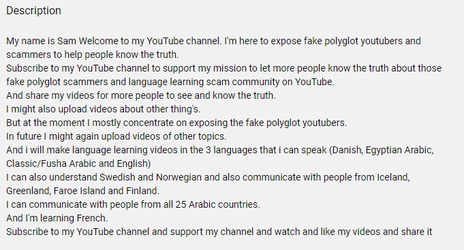
At least a couple polyglots he has ranted about have actually taken the bait and have made videos about him:
It should be noted that there are people in the language learning community who have tried to address the problem even though a majority of them are too afraid to name names or directly criticize specific people. There are times though when these people have been caught. A famous example is Ziad Fazah who appeared on Chilean TV where he was given questions by native speakers of the languages he claimed to knew and embarassed himself on TV. It starts around 6 minutes into the video. Although it isn't subtitled, it is pretty obvious he is struggling.
Thanks
@Prophetic Spirit for the English transcript
- Diana Bolocco (yes, i know who's she): A little presentation to Ziam & "Now we're gonna ask some foreigner residents in Chile and Sami gonna ask a question to Ziam".
- Sami Salem: I don't know Egyptian but i'm sure he's asking something related to living in Chile.
- Diana Bolocco: "Before, explain to us what he asked to you"
- Ziam: "He asked how much i'm living in Chile" and i don't know what the fuck is rambling in this part.
- Sami: Again, i don't know Egyptian.
- Ziam: Probably using Egyptian, but i don't know.
- A nice racist joke for part of the program: "Where you parked the camel?" (Lol).
- Sami: "The country is nice and friendly"
- Auli: Asking something in Finland, which i don't know yet.
- Ziam: "She told me about the language Finland" and again, more non-sense ramblings. Nice.
- Alvaro Salas (hah, i remember the name of that fuck too): "Now ask something in Finland" (to Zaim). "Now i want to see you" (lol).
- Ziam: Asking about something in Finland related to the capital.
- Auli: "We're lost enough, 'cus i ask about 5 millions of Finland speakers like us and Sweden which is indigenous language and i want to know what's better for Finland" (Hah, yep; this is the part when the polyglot is failling)
- Alvaro: "And what he's asking?"
- Auli: "He answered about learning Finland for 3 months and in the capital nobody helping us to comprend the language. He doesn't understand the topic i asked, but i understand what he's trying to say"
- Alvaro: He's presenting the Pakistani guy.
- Abdulah: Starts with a joke. Funny. "He (Ziam) learned 58 languages. I'm gonna give him a text. It's a hymn of my country."
- I'm sure is Persian text, but i can be wrong.
- Ziam: Reciting the Persian text.
- Abdulah: "He knows the arabian alphabet, not the Persian one. He talked like 5% of the actual hymn" (lol). Talks in Persian.
- Ziam: "He's talking about how Persian is different with their own alphabets" and shit like that.
- Abdulah: "I don't asked that. I asked if he knows about the superficial level of Persian (Farsi) or learned the roots of the language. Example about how Persian poets he knows.
- Salas: "How much you're living in this country?"
- Abdulah: "33 years"
- Salas: "If i speak to you quickly you gonna understand?"
- Abdulah: "Heh".
- Salas: "If he studies 2 months or 3 months..."
- Abdulah: "Not natural" (Lol).
- Dianna Bolocco is presenting a ex-Soviet (Russian) Olympic coach and coach (now ex, obvious reasons of time) of the soccer team Universidad Católica. "Ask something simple in Russian, not dialects this time"
- Stanislav: "I'm gonna ask something short" Asks in Russian:
- Ziam: Repeats a Russian word, like "what"; i'm sure.
- Diana: "What's the question to him" (to Stanislav)
- Stanislav: "Just a moment"
- Salas: Another joke, now with poop. Lol. This fucking presentator.
- Iván Zamorano talks something about the caco word. Well, to explain to non-Spanish speakers, one of those Russian words sounds like Caca, which is poop in Spanish.
- Ziam: "One more time" (reffering to repeat the question).
- Satinslav repeats in a suprisingly single manner this time.
- Ziam: "One thing, those idioms like Croat, he doesn't warning me of those languages here. If he warned me with anticipation those idioms, i could be prepared because since 20 years i don't practiced those" (wtf)
- Coco Legrand, speaking in English with a joke in mind; but i assure you, he's Chilean.
- Ziam answering.
- Salas following the same joke with the name of the program, nothing special in this part.
- Now he's talking about Chinese. Ziam is answering about having more knowledge than Persian.
- Xu is featured. He's asking something in Cantonese.
- Ziam is... answering in Cantonese i think.
- Xu is following.
- Ziam: "Where did he learn Cantonese" and shit like that. He's reffering to himself in the explanation.
- Xu denied the explanation. "I asked about what human work from the Earth is seen in the moon" (of course, the Great Chinese Wall). "What's the length of the Great Chinese Wall"
- Salas is presenting a Greek important person, Jrici.
- She's asking something in Greek. "It's easy" (lol)
- Ziam is rambling in Greek it seems. Said something about patience randomly. And finally: "One more time, please"
- Jrici repeats the same question.
- Salas explaining the Greek language is the most difficult as a joke.
- Jrici explaining between the laughs about the same question Coco Legrand asked, and that's about: "How many days are you going to be in this country?". "Even was a repeated question"
- Diana presenting a Indian guy, but Ziam simply rejects the conversation (ultra lol). Poor man.
- Anyway, Nick is gonna answering a simple question in Hindu. Well, actually he said in Hindu the name of the program. Lol.
He does defend this saying that he was set up and he didn't prepare himself to speak more than just Spanish, yet isn't that the whole point of speaking fluently in that you can say the language and respond to novel questions spontaneously without having to prepare yourself? By the way, he actually held the world record for most languages spoken, but after that fiasco, it started calling into question how exactly you determine who speaks the most languages? What degree of fluency needs to be achieved for a language to "count?" how do you determine whether someone is fluent? Either way, a common trend is that the more languages you study, the more thin you spread yourself out and the more easy it is to become a "master of none."
By the way, other people have came forward since then and claimed to speak even more languages than Ziad Fazah, but they are still very much up for debate like
this guy who claims to speak 73 languages.
A relatively more recent time a polyglot was caught was when Benny Lewis claimed he could learn Chinese and be at least a C1 level (nevermind there is an actual Chinese assessment that is more accurate) in 3 Months (hence, his fluent in 3 months program) and he demonstrated it on a train on a trip to China:
People in the Chinese learning reddit who understood what was going on, completely called him out on it saying that he was only saying stock questions and responses and gave no indication he could understand what the other people were saying and wasn't responding appropriately:
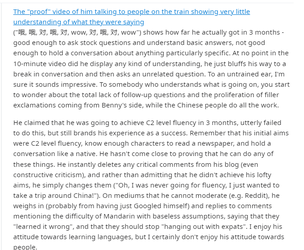
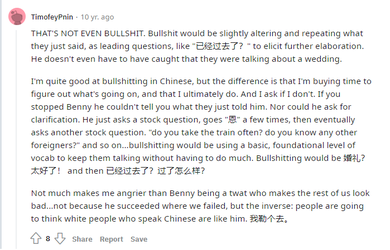
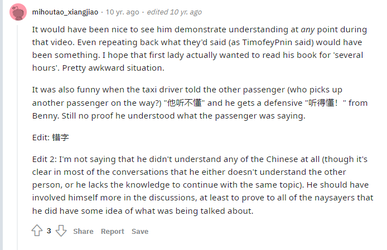
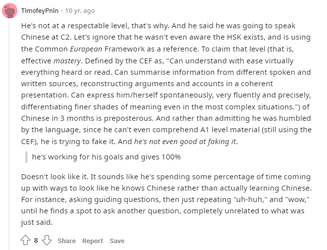 Conlanging Community
Conlanging Community
Constructed languages have been long before the internet and even back before the internet there was plenty of autism surrounding it. An infamous historical example is Volapuk which was created in 1879 by a German Catholic priest named John Schleyer who claimed he heard the voice of God during a manic episode telling him to create a universal language and over the course of the year set out to make a universal language. The abomination he ended up making was extremely difficult and awkard to use. The lexicon was made up of Germanic inspired words distorted beyond all recognition from their original so "nobody would have an advantage" and a very cumbersome use of cases. This made it very hard to learn, yet despite it being a product of a manic-psychotic state, he did get a following... but then Esperanto came out and it was so much easier to learn so they went there.
Another form of pre-internet drama was Blissymbolics, a constructed universal writing system made by a guy named Charles Bliss who was inspired by Chinese characters. intended to be easier for nonverbal disabled children to learn. He introduced these symbols to a special school in Canada and the kids started using him. However, he was very much a control freak and didn't like the way they were being taught and how the teachers were adding their own symbols to meet the students needs or not using them correctly and that the writing system was... evolving like any sort of language system does overtime. He got so fed up with them not using his symbols exactly the way he wanted that
he sued in 1981 which ended in a settlement of 160,000 dollars. Though because of Bliss tard raging at anyone who dared used his system exactly the way he wanted, this effectively made his system fall into obscurity in favor of other AAC systems for disabled children like PECs, sign language, and assistive technology
There is also always people in the Esperanto community wanting reforms to the language and often making their own spin-off language like, Ido, Interlingua, Novial, and so on. Usually for reasons because Esperanto is deemed to be "too sexist" or not inclusive of Asian languages among other reasons. None of these new languages however, have not even reached close enough to Esperanto's relative success as a conlang.
The point I am making is, autism in the conlanging community has been going on way before the internet. The internet just made it easier to document.
La'adan
The philosophical language, La'adan, which is a constructed tonal language loosely based on Navajo made by a feminist and linguist Suzette Haden Elgin as an experiment to see if she could make a language that could somehow allow women to express themselves better. She also wrote a trilogy of sci-fi books based on the language as well. A very common criticism of the language though is that it isn't inclusive to lesbians and now trans women. These criticisms have been going on since the 80s with lesbian feminists, but now that she is dead, people have been trying to add new words. The thing though is that unlike Esperanto where Zamenhoff included affixes to create new words, La'aden didn't create a sufficient number of them and nobody can seem to come to a consensus.
The weird world of Artlangs
The majority of conlangs fall into the category of being an artlang, typically for a work of fiction, but not always. Much like finding inflation art on deviantart, you can often find a lot of unusual concepts for conlangs, many of them outright bizarre, especially if you consider the autistic amount of time and effort put into them. It often makes you go... Why??
Blowese! A language you can speak for when you give a blowjob!
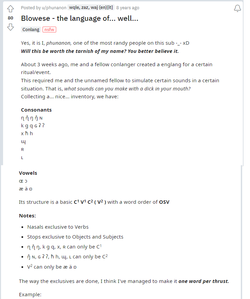
Someone also made a constructed language based exclusively on emojis and is dead serious about it.
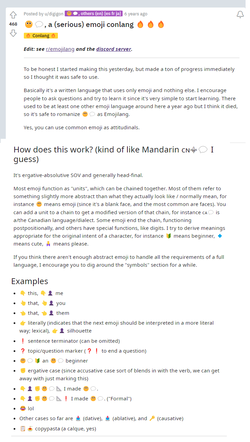
You also see a lot of posts of people posting their dumb ideas.

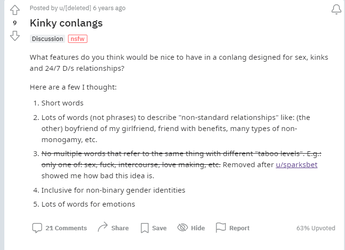
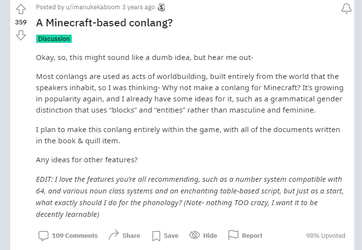 Attempts to raise native speakers
Attempts to raise native speakers
In order for a language to become a full fledged language, it needs to have a community of native speakers! There have been many attempts to teach kids from birth constructed languages. It has been going on for several generations in the Esperanto community to the point that in some families, it is the language spoken in their homes. Fortunately, nobody has been crazy (yet) to completely deprive their child of a real language and teach them just that, but still, at that early stage in life, wouldn't it be more useful to teach them a real language?
In the Toki Pona subreddit, there is a person who is raising their kids to be the first Toki Pona native speakers. If you don't know, Toki Pona is a language where the whole gimmick is that there is only 200 words. It is designed for you to think more simply. This parent obviously has ran into a few problems with raising their kids because well, it wasn't really intended to be taught to babies and toddlers.
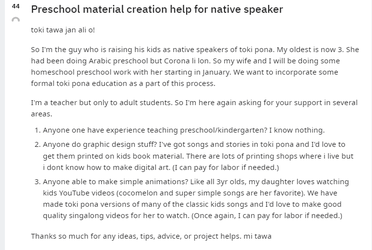
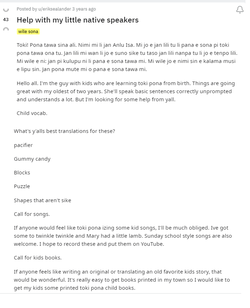
There was also a guy back in 1994 who tried to
raise his son Alec to be a native Klingon speaker. This went on for three years until Alec stopped listening to him and ultimately caused his son to resent him for turning him into a test subject.
It is not suprising that this didn't work though because in order to successfully raise a bilingual child, you have to have a solid community of speakers to speak to your kid with. The problem with the Klingon guy was that he was the only one who spoke in Klingon with his son while his mother, grandparents, and preschool all spoke to him in English, the only way for it to work was if they isolated him and his mother and father only spoke to him in Klingon where he was forced to use it, but that would be a CPS case waiting to happen. Not to mention due to the vocab limitations in the language, especially since in Klingon's case only a few several new words are added every year by only one guy who is the only one that has the authority to do so, it is a lot harder to express oneself with a not fully realized language where one is not in the authority to or has a way to coin new words. This is also compounded with the fact that the word order and grammar is very counterintuitive because it was trying to be alien on purpose and there is a good reason why you don't see natural languages where the direct objects come before the noun.
It should be noted that most Klingon language speakers actually don't watch or are fans of Star Trek and some even hate it. Most of them are only into the language just because they like languages. Speaking of Klingon, this brings up another point...
Intellectual Property Disputes
An example of pre-internet drama involving copyright dispute of a language is the creator Cooke Brown's Loglan which is a language designed to be a language with no ambiguities and designed to help people think more logically. What happened was Robert Heinlein used the Loglan language in one of his books and this caused a dispute which Heinlein ultimately won, though by the time the verdict was reached, people created a free version of Loglan that anyone could use and has pretty much surpassed Loglan due to Cooke Brown's very strict control over the language which doesn't really work due to the nature of languages being very much a group effort. (source)
A common problem that occurs in the conlanging community is who exactly owns the languages. It is pretty silly to claim to own a natural language like English or Spanish (though there have been some instances with indigenous languages claiming ownership and not wanting anyone else to learn it use it despite their language being endangered like the case with the Mapuche suing Microsoft over offering language support for them
source ), but with conlangs, this blurs the ling between being a work of art and a theoretically functional language.
In
2016 Paramount sued a fan film for copyright which included use of the Klingon language. Of course, making fan works of anything, especially if the owner of said property you are basing it on is very anal and/or greedy about their intellectual property, it always has the risk of being sued. This did spark a lot of debate for a while, but in
2017 the courts ruled that the use of the Klingon language is not copyrighted.
Another more recent dispute was with the Tasmanian Aboriginal Center and their constructed language that was constructed using various extinct indigenous Tazmanian languages called Palawa Kani. They are extremely protective of the language and refuse to let anyone who is not of aboriginal descent learn it or have access to any of the learning materials. In 2012, the center demanded that Wikipedia take down the page about Palawa Kani, but to no success.
(source)
The fact that conlangs are a legal grey area means that there is a lot of potential for a lot of drama and legal disputes.
Notable "polyglots" and grifters:
Areih Smith / Xiaomanyc
Youtube /
personal blog (archive) /
Twitter/
Instagram
Wouter Corduwener
Youtube /
Instagram /
Twitter
Ikenna (He left Youtube, but is still currently working on his own app)
Youtube /
Website (archive)/
Instagram /
Ikenna
Benny Lewis / “Fluent in 3 Months”/ Irish Polyglot (this least bad of them, but his methods are deceptive)
Youtube /
website (archive)/
Twitter /
Instagram
Laoshu / Moses Monweal McCormick (died of heart complications last year, Youtube channel still up)
Youtube
Matt Bonder / Matt vs. Japan
Youtube /
Ken Cannon / Japanese Through Anime
website (archive) /
Notable Conlanging communities and websites:
r/conlangs (archive)
conlang.org database (archive)
More will be added to this list I will add social media accounts.
If anyone who is a fluent or at least advanced speaker of any languages that these polyglots claim to speak are willing to analyze some stuff or if you have more content or suspected grifters to add, then please comment. The more content and evidence the better. I also suspect they have a presence on Tiktok, but I don’t go on Tiktok so I do not know.
Feedback is appreciated, this is my first real thread I wrote by myself.